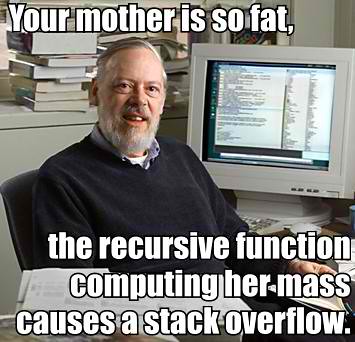Today there's one week left on my self-imposed no-gaming exercise . I
like to make this kind of exercise for various things (not eating $foo
for this amount of time, not doing $bar, etc.), so by itself the
exercise was not a special event. But computer gaming is one of my
favourite activities, so it was rather interesting. There were to
goals to this: gaming is addictive (can I stop playing for three
entire months?) and gaming eats time (how much time do I gain?).
Last time I tried such an exercise (for a month), it ended early by me
accidentally playing, of all things, nethack: someone told me at work
hey, you know we have a nethack server? and before I realised what I
was doing I was already playing nethack for half an hour. In an
xterm. With no graphics, no sound, but with coloured ASCII chars.
In truth, I started the new attempt rather accidentally. I travelled a
lot this summer, and so I was already a month without playing
games. Realising this, I said to myself: I already didn't play for a
month, and it goes fine, let's see if I can make it a three months
official no-gaming exercise. So, my Windows partition went away, my
save games were put aside, my few Android games were uninstalled, and
I was ready.
How did it go? Very interesting.
After two weeks, I was having lots of free time. Long-delayed
tasks were finally taken care of, unread books were getting attention,
and in general I had time on my hands.
A month into the exercise, somehow my free time was creeping away. I
took on some new (periodic) tasks, I was reading more, and by one and
a half months I was back to zero on free time advantage.
Lesson 1: people expand their schedule until it eats all their
free time.
After about two months, I was still doing fine, but I had a few times
the classical addiction dreams: you dream you visit someone, and
they're playing a new game, and ask you Don't you want to play? , or
someone tells you about a nethack server, and without realising, you
ruined your exercise. I had this kind of dreams while giving up other
things, so it was definitely a withdrawal symptom.
Lesson 2: you might have given something up, but your brain didn't
(yet).
With three weeks left, I said: it's time for me to start building a
new gaming machine, so that when I'm done with the exercise, I can
start playing right away. And this is where the problems started. For
until then, I was not thinking about games at all. But once you
install your new Win7, the graphics drivers, you start to wonder what
new games were launched, what new expansions were released, and
suddenly you realise you skipped many games, and how can you not play
them? A week later, my Steam and GOG wish lists have increased
greatly, and another week later I was already with many newly-bought
games.
Lesson 3: giving up computer games for a just few months is only
partially a time saver: while the backlog of non-played games
doesn't contain all games that you skipped, it's still a significant
backlog. Such an exercise is rather more useful to shift free time
around, than an absolute time saver.
At this point, I was talking with colleagues about all the new games,
the expected launches during the holiday season, etc. like I didn't
stop playing games. The funny part was that in the second half of
November, Slashdot had not
one
but
two
articles about people not being so much interested in games
anymore. Believe me, if you cannot play games for a period while your
friends very much talk about how awesome hot new game X is after a
while you won't have this lack of interest problem anymore (of course,
I'm extrapolating from my experience, etc. etc.). On top of that, on
Planet Debian was
another
blog post about what game to play . All these were like a general
reminder about playing games

This moment (two weeks left) was also the hardest moment, with
the sweetest temptations: machine installed, games installed, all set,
just need to press
New game.
Lesson 4: abstaining from a thing is much harder if said thing is
readily available, or in your face . Quite obvious in hindsight
So here I am, with
just one week left. It was an interesting thing
to do, and it was definitely worth the effort, if not for time gained
but for learning about oneself. Only one question remains: next week,
which game shall I play first?



 My
My  I don't know how many people followed along. I read .. not every message,
but a large fraction of them. I see 40 or so unique NNTP connections per
day, and some seem to stick around and read for quite a while, so I'm
guessing there might be a few hundred people following on a weekly basis.
If you're not one of them, and don't read our
I don't know how many people followed along. I read .. not every message,
but a large fraction of them. I see 40 or so unique NNTP connections per
day, and some seem to stick around and read for quite a while, so I'm
guessing there might be a few hundred people following on a weekly basis.
If you're not one of them, and don't read our

 I moved
I moved 

 Image credit:
Image credit: 
 For those of you who follow me through anything other than
For those of you who follow me through anything other than  This moment (two weeks left) was also the hardest moment, with
the sweetest temptations: machine installed, games installed, all set,
just need to press New game.
Lesson 4: abstaining from a thing is much harder if said thing is
readily available, or in your face . Quite obvious in hindsight
So here I am, with just one week left. It was an interesting thing
to do, and it was definitely worth the effort, if not for time gained
but for learning about oneself. Only one question remains: next week,
which game shall I play first?
This moment (two weeks left) was also the hardest moment, with
the sweetest temptations: machine installed, games installed, all set,
just need to press New game.
Lesson 4: abstaining from a thing is much harder if said thing is
readily available, or in your face . Quite obvious in hindsight
So here I am, with just one week left. It was an interesting thing
to do, and it was definitely worth the effort, if not for time gained
but for learning about oneself. Only one question remains: next week,
which game shall I play first? 